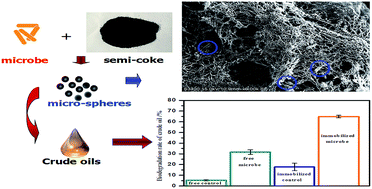Most petroleum hydrocarbons are dangerous for the environment and are known to be toxic. These chemicals can cause severe respiratory problems, mutations and cancer. A very particular type of hydrocarbons, known as polycyclic aromatic hydrocarbons (PAHs), represents a serious environmental threat. PAHs can obviously be dangerous when directly inhaled, but they are especially harmful since they can accumulate in water, sediments and soil, taking decades to decompose and thus polluting ecosystems for generations.

A few years ago, some scientists observed that certain species of bacteria had developed, by the means of natural selection, the ability to degrade molecules like hydrocarbons or polymers. Some of these species have evolved to degrade PAHs such as naphthalene, phenanthrene or pyrene, which means that they can be used to treat the waste of certain chemical plants, lowering the amount of these dangerous products released in to the environment.
Using tools like artificial selection or genetic engineering could enhance the efficacy of these bacteria. Moreover, the influence of some external factors may be optimized to improve the conversion of pollutants to non-toxic substances. In this article, recently published in Environmental Science: Processes & Impacts, Professor Mutai Bao and his team studied the effects of supporting bacteria on biodegradable, porous, low-cost materials like semi-coke, walnut shells and activated carbon. Immobilization methods are widely used and accepted by the scientific community because they are versatile and straightforward. Moreover, these systems can be easily cleaned and reused.
Before performing the experiment, scientists had to choose the right species of bacteria. They also had to let them adapt until they were able to properly digest PAHs. To facilitate this, bacteria were fed small amounts of classic carbon sources: glucose, lactose, starch or urea. The ones that received the combination of lactose and PAHs gave the best biodegradation results and were used for the optimization.
After a series of experiments, the authors concluded that immobilized bacteria degrade up to 47% more PAHs than free microbes. Semi-coke was the best support for these microorganisms, followed by walnut shell and activated carbon. In addition to this, they found bacteria to be adaptable to a broad range of pH and salinity. These biodegradation systems could be used in real-life situations such as oil spills in the ocean, where usually other techniques are less productive.
Interested in this research? Click on the link below to read the full article for free*
Biodegradation of different petroleum hydrocarbons by free and immobilized microbial consortia
Tiantian Shen, Yongrui Pi, Mutai Bao, Nana Xu, Yiming Li and Jinren Lu
Environ. Sci.: Processes Impacts, 2015, 17, 2022-2033
DOI: 10.1039/C5EM00318K
—————-
Fernando Gomollón-Bel is a PhD Student at the ISQCH (CSIC–University of Zaragoza). His research focuses on asymmetric organic synthesis using sugars as chiral-pool starting materials towards the production of fungical transglycosidase inhibitors.
—————-
* Access is free until 18/02/2016 through a registered RSC account.











